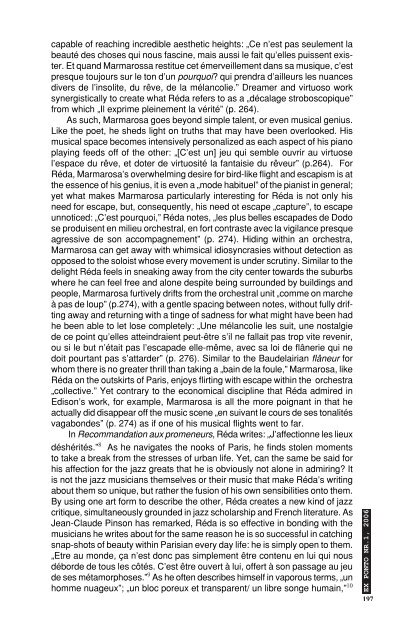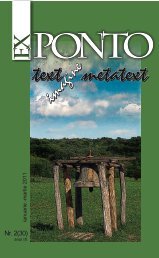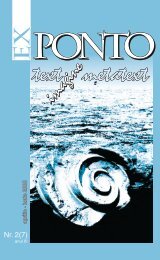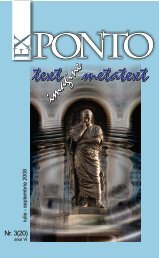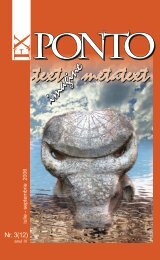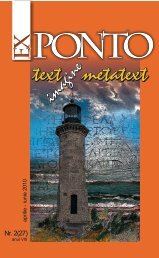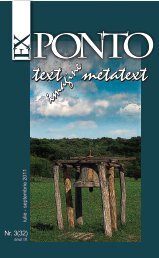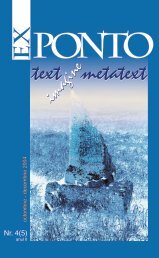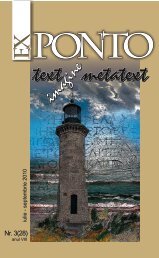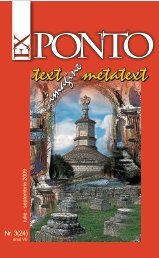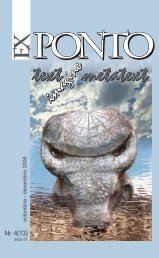Nr. 1 (10) anul IV / ianuarie-martie 2006 - ROMDIDAC
Nr. 1 (10) anul IV / ianuarie-martie 2006 - ROMDIDAC
Nr. 1 (10) anul IV / ianuarie-martie 2006 - ROMDIDAC
Create successful ePaper yourself
Turn your PDF publications into a flip-book with our unique Google optimized e-Paper software.
capable of reaching incredible aesthetic heights: „Ce n’est pas seulement la<br />
beauté des choses qui nous fascine, mais aussi le fait qu’elles puissent exister.<br />
Et quand Marmarossa restitue cet émerveillement dans sa musique, c’est<br />
presque toujours sur le ton d’un pourquoi? qui prendra d’ailleurs les nuances<br />
divers de l’insolite, du rêve, de la mélancolie.” Dreamer and virtuoso work<br />
synergistically to create what Réda refers to as a „décalage stroboscopique”<br />
from which „Il exprime pleinement la vérité” (p. 264).<br />
As such, Marmarosa goes beyond simple talent, or even musical genius.<br />
Like the poet, he sheds light on truths that may have been overlooked. His<br />
musical space becomes intensively personalized as each aspect of his piano<br />
playing feeds off of the other: „∂C’est un∑ jeu qui semble ouvrir au virtuose<br />
l’espace du rêve, et doter de virtuosité la fantaisie du rêveur” (p.264). For<br />
Réda, Marmarosa’s overwhelming desire for bird-like flight and escapism is at<br />
the essence of his genius, it is even a „mode habituel” of the pianist in general;<br />
yet what makes Marmarosa particularly interesting for Réda is not only his<br />
need for escape, but, consequently, his need ot escape „capture”, to escape<br />
unnoticed: „C’est pourquoi,” Réda notes, „les plus belles escapades de Dodo<br />
se produisent en milieu orchestral, en fort contraste avec la vigilance presque<br />
agressive de son accompagnement” (p. 274). Hiding within an orchestra,<br />
Marmarosa can get away with whimsical idiosyncrasies without detection as<br />
opposed to the soloist whose every movement is under scrutiny. Similar to the<br />
delight Réda feels in sneaking away from the city center towards the suburbs<br />
where he can feel free and alone despite being surrounded by buildings and<br />
people, Marmarosa furtively drifts from the orchestral unit „comme on marche<br />
à pas de loup” (p.274), with a gentle spacing between notes, without fully drifting<br />
away and returning with a tinge of sadness for what might have been had<br />
he been able to let lose completely: „Une mélancolie les suit, une nostalgie<br />
de ce point qu’elles atteindraient peut-être s’il ne fallait pas trop vite revenir,<br />
ou si le but n’était pas l’escapade elle-même, avec sa loi de flânerie qui ne<br />
doit pourtant pas s’attarder” (p. 276). Similar to the Baudelairian flâneur for<br />
whom there is no greater thrill than taking a „bain de la foule,” Marmarosa, like<br />
Réda on the outskirts of Paris, enjoys flirting with escape within the orchestra<br />
„collective.” Yet contrary to the economical discipline that Réda admired in<br />
Edison’s work, for example, Marmarosa is all the more poignant in that he<br />
actually did disappear off the music scene „en suivant le cours de ses tonalités<br />
vagabondes” (p. 274) as if one of his musical flights went to far.<br />
In Recommandation aux promeneurs, Réda writes: „J’affectionne les lieux<br />
déshérités.” 8 As he navigates the nooks of Paris, he finds stolen moments<br />
to take a break from the stresses of urban life. Yet, can the same be said for<br />
his affection for the jazz greats that he is obviously not alone in admiring? It<br />
is not the jazz musicians themselves or their music that make Réda’s writing<br />
about them so unique, but rather the fusion of his own sensibilities onto them.<br />
By using one art form to describe the other, Réda creates a new kind of jazz<br />
critique, simultaneously grounded in jazz scholarship and French literature. As<br />
Jean-Claude Pinson has remarked, Réda is so effective in bonding with the<br />
musicians he writes about for the same reason he is so successful in catching<br />
snap-shots of beauty within Parisian every day life: he is simply open to them.<br />
„Etre au monde, πa n’est donc pas simplement être contenu en lui qui nous<br />
déborde de tous les côtés. C’est être ouvert à lui, offert à son passage au jeu<br />
de ses métamorphoses.” 9 As he often describes himself in vaporous terms, „un<br />
homme nuageux”; „un bloc poreux et transparent/ un libre songe humain,” <strong>10</strong><br />
EX PONTO NR.1, <strong>2006</strong><br />
197


